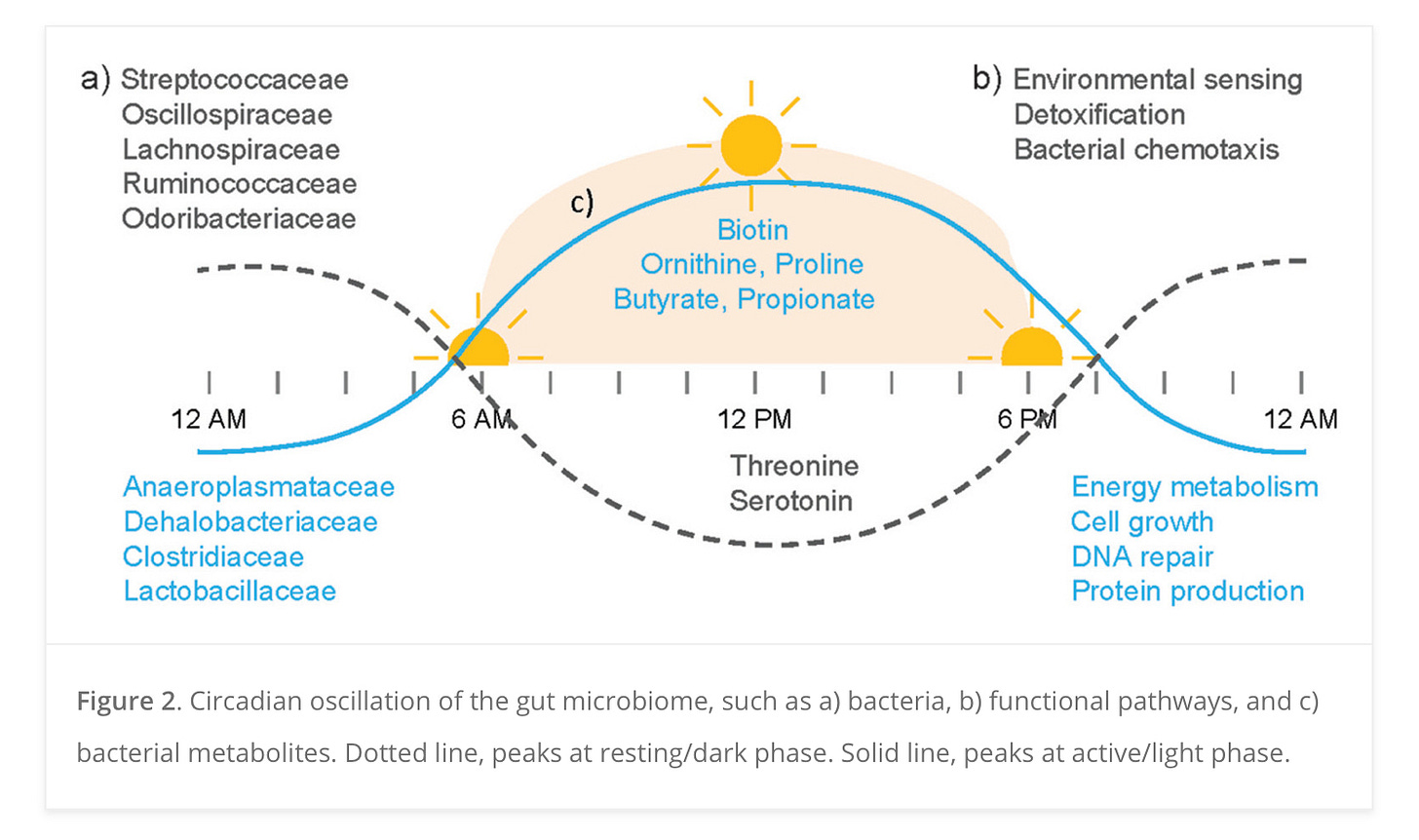How to do intermittent fasting without wrecking your hormones (and ultimately gaining weight every time you eat a carb)
Improve your genome, too 🧬

Intermittent fasting is a popular topic these days, and for good reason! Fasting is a super important part of our digestive process.
You have probably even seen or heard me teaching about the importance of fasting in the past. This is because the feed/fast cycle is a complementary lifestyle choice that entrains the circadian rhythm along with the light/dark environment and other daily habits.
Most of dieting culture talks so much about what and how much we eat, and neglects the factors related to when we eat. This is super bonkers when you look at how the regulation of digestion (and thereby metabolism) actually works.
You can even zoom in at just the microbiome, and this will give you even more of a clue why the current fad of intermittent fasting (particularly the way I most often see it done, which I will describe below) is such a bad idea in the long run.
As you can see from the graphic above, the gut starts firing up to eat as soon as the sun comes up, and then winds down at sunset. However, everyone I have talked to who has been doing intermittent fasting (and having poor results, particularly becoming intolerant of carbohydrates and then gaining unwanted weight every time they mess up their diet even a little bit), skips this morning digestive window! So then what happens?
Without the morning meal to take advantage of the gut microbiome’s activation and give the stretching cues to the peripheral circadian clocks in the gut, a crazy game of whack-a-mole begins with glucose (ie, sugar - the stuff that your body stores as fat).
Here’s what to do instead so your fasting is aligned with what your body expects from a circadian standpoint:
Stop eating for the 2.5+ hours before bedtime (and through the full sleep window). Boost this effect by also:
resting (not exercising) after sunset
dimming the lights (less than <3.0 lux, or <1.0 lux for more light-sensitive people—that’s as bright as the full moon, or a single candle flame) ← I recommend getting your house set up with circadian “sleep lights” such as these from Block Blue Light (use code NIKKO for 10% off your order)
decrease the ambient air temperature to 67 Fahrenheit or less
boost your oxytocin with cuddles (a warm water bottle is a great bedtime companion if you sleep alone)
These overnight "fasts" from food, exercise, and light/heat work by synchronizing circadian rhythms. This in turn changes the genome itself to express in healthier ways. Check out the research on that here: Circadian rhythms, food timing and obesity (2016).
Set yourself up for success by eating a protein-packed meal first thing in the morning when you wake up. You’ve heard about this for hormone health already, but it may not seem like part of your fasting routine. It is! By high-protein, I mean >30 grams of high-quality protein. A good way to achieve this is to set your slow cooker overnight to have a roast ready and then top it with some over-easy eggs. Alternatively, seafood cooks up very quickly (bone broth poaches fish, shrimp, oysters, etc really fast and you can also swirl the boiling soup and add a couple of eggs to that for choline and it’s really tasty and quick). Hard-boiled eggs are easy to keep on hand, but each egg has only about 6 grams of protein so they are best paired with other proteins.
And finally, seal the deal for your happy circadian rhythm by taking a morning walk so you get some bright outdoor light (no sunglasses or sunscreen) and movement to really give your body all the routine signals to communicate: body, come on, it is time to wake up! Waking up all the way in the morning is key to your being ready to wind down at night and get the full benefits of your circadian intermittent fasting schedule. The morning light sets your circadian rhythm and sets a kind of timer that will go off in the evening by releasing melatonin on time so your body can enter the rest and repair stage.
This is how you can practice a long-term intermittent fasting schedule without relapsing into weight-gain (and the frustrating “whack-a-mole” game of hormonally induced carbohydrate-sensitivity).
Need support in optimizing your schedule? Get in touch with me about 1-1 consultations.
Community Updates:
The replay of my morning sickness, NVP and HG class, which does much deeper into the specifics of how circadian and quantum biology affect the digestive system, is now available for all paid subscribers in our replay archive.
I was recently on The Responsive Family Sleep Podcast, and the episode is available now on Apple and Spotify.
My research compendium is live! Get all my research linked together in 1 PDF that answers the most popular questions in circadian and quantum health. Visit my personal website to learn more.








Very cool to see how our digestion ebbs and flows throughout a day! I struggle with going to bed hungry if I stop eating a few hours before bed. Working to keep improving but it’s been a long-term struggle!😨
Is it best to eat upon rising, even if we're getting up very early? I get up a couple of hours before the children so I can have some quiet time (allowing me to go to bed earlier at night, too)... I'm never hungry when I first wake up, and it's also still dark outside (especially in winter). Does it make sense to wait until it's light outside, or is it best to eat based upon wake time?